Oil & Gas
FIRST SHIPMENT OF OIL FROM A FIELD WITH RESERVES OF 650 MILLION BARRELS SOLD.
Irene Jerry

Equinor, Norway's energy company, has sold its first oil shipment from the Johan Kastberg field in the Barents Sea, ahead of the field's expected production starting next month. The sale was made to Spain's Repsol, likely for refining at the Bilbao facility, which has a capacity of 220,000 barrels per day.
Although the field was originally planned to begin operations in the last quarter of 2024, its start-up was delayed several times, first due to poor weather conditions, and later to April 2025.
Equinor operates the Johan Kastberg field with a 50% stake, while Var Energi holds 30% and Norway's state-owned Petoro owns 20%. The first oil shipment from the field was initially scheduled for loading in February 2025 but has been postponed to April 14-17, 2025.
The export program for that month includes four shipments, each with a capacity of 700,000 barrels, with Equinor responsible for three, while Far Energy will handle the fourth. Details about the price of the first shipment remain unclear, but it is believed that the crude may be priced similarly to other Norwegian crudes, such as Troll or Alfheim.
The Johan Kastberg field is expected to produce 220,000 barrels per day and has estimated recoverable reserves between 450 million and 650 million barrels. The crude from the field will be rich in medium distillates, with a density of 34.7 degrees on the American Petroleum Institute scale and a sulfur content of just 0.16%. When production starts, the crude is expected to meet the market demand for high-quality oil.
Meanwhile, Equinor is facing pressure from investors over its climate strategy. Sarasin & Partners, an asset management firm involved in climate talks with Equinor, sold its shares in the company in January 2025. Sarasin's decision was based on the belief that Equinor's strategy no longer aligned with the global goal of limiting global warming.
Despite being seen as a potential leader in the energy transition, Equinor's recent moves, such as expanding oil and gas production and lowering renewable energy targets, led to criticism. However, Equinor maintains that its strategy has remained consistent, adapting to the slower-than-expected pace of the energy transition.
